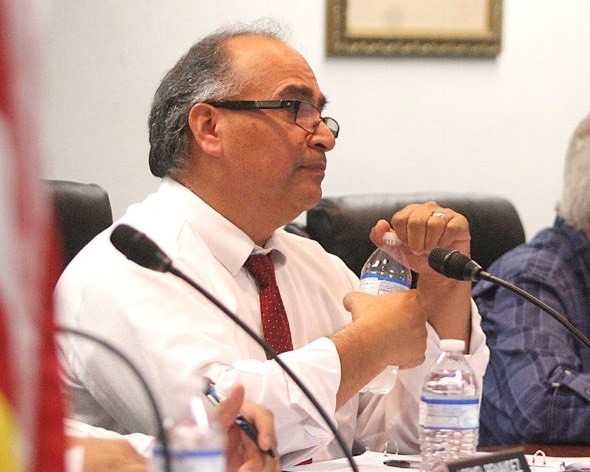Mercedes city officials got their first look at how the COVID-19 pandemic has begun to impact finances during a mid-year budget workshop Tuesday. Over the last three months alone, the city has seen a six-digit decrease in sales and hotel/motel tax revenues.
As the losses continue to mount, and with sales tax reports from April still pending, the Mercedes City Commission met to discuss where the city’s financial reserves stand, and how its outstanding debt obligations will be impacted.
“When we had our (budget) workshops last summer, there were certain assumptions that were made, projections that were reasonable with regards to the revenues that were coming in,” Mercedes City Manager Sergio Zavala said at the top of the hour-and-a-half long workshop.
“There was no way that any city could have forecasted, could have seen what the epidemic could have done to the sales tax revenues that were depleted,” he said.
Officials of the Queen City held multiple budget workshops throughout August and up until the statutory deadline for approving a budget last September. Those talks were fraught with line by line scrutinizing of expenditures within each city department.
After weeks of discussion, the commission passed a lean budget with two major caveats: that abolishing a $2 utility fee charged to utility account holders monthly could result in a $100,000 deficit, and that the utility fund — typically a self-sustaining operation in most municipalities — was instead being subsidized by the general fund to the tune of $2 million.
Additionally, the city has a number of outstanding certificates of obligation — millions of dollars of debt issued to tackle myriad infrastructure issues — from drainage, to water and sewer, to street improvements.
The budget city leaders approved in late September included $11.5 million in the general fund — a $233,000 increase over the previous fiscal year — and represented a delicate balancing act between the city’s obligations and its available cash.
However, COVID-19 has, as Zavala characterized it, “thrown a monkey wrench” in the plan.
Sales tax information released in April by the Texas Comptroller of Public Accounts shows the city’s coffers are already bleeding money. Worse yet, the comptroller’s figures represent a two-month lag in reporting. April’s report shows the effects on sales tax for the month of February, Finance Director Nereida Perez explained.
The city won’t have a true grasp of how the March and April closures of the Mercedes Premium Outlets and other retailers will have taken a toll until June, at the earliest, Perez said.
“We know that the mall was closed for at least two weeks in March and all of April, so all of those sales tax was lost. And the outlet mall makes up at least 60% of our sales tax revenue,” Perez said.
Later on in the workshop, Perez estimated the widespread business closures over the past three months have slashed as much as 75% of sales tax revenues compared to last year. “Last fiscal year, our revenue was at $1.4 million for these three months. But due to the current situation … the estimated sales tax revenue for these three months is at $350,000,” she said.
“The estimated loss is at around $800,000. Of course, these are estimated numbers. It could be more or it could be less,” Perez said.
But it’s not just the loss of shoppers that is affecting the city’s bottom line. Pandemic related travel restrictions have impacted Mercedes’ hotel/motel tax collections, as well. Perez estimated that that revenue — initially projected to bring in $85,000 — has decreased by $35,000 over the three-month period.
For Mayor Henry Hinojosa, the losses were sobering; however, the uncertainty over how much longer the pandemic will last is the greater cause for concern when it comes to how the city should move forward. “Let’s try not to get into the reserves if we can,” Hinojosa said.
“If we can avoid getting into the reserves, because the virus is estimated to get worse and there’s supposed to be a second wave. And even though some states are opening up businesses this coming Friday, there are still deaths that are mounting,” he said.
Attending the meeting via telephone, one of the city’s financial advisors, Dusty Trailor, agreed. “…Because of so many things being closed, plus further uncertainty about the duration of the time that we’re gonna have to endure this virus, and the dramatic economic slowdown … we need to be very mindful of the reserves, because you didn’t build them up overnight,” he said.
One positive note from the workshop came from the city’s debt service. Of the $3.1 million in principal and interest the city is due to pay in FY2020, the bulk of that obligation came due on Feb. 15, just before the pandemic struck.
“But the principal portion of your payment is due on Feb. 15. So what remains is just half of an annual interest payment that will be due on Aug. 15,” Trailor said.
Mercedes remitted $2.7 million in February to pay down its CO debt, and will need to pay just $415,000 in interest come August, Perez explained.
The commission took no action during the workshop, which was meant merely to provide an update on the city’s financial health. However, both the city manager and finance director are looking into where expenditures can be reduced.
Already, Mercedes has instituted a budget freeze, and is considering making budget cuts.
“One of the things that we can come back with is some of the cuts, the adjustments, if you will, en masse,” Zavala said.




